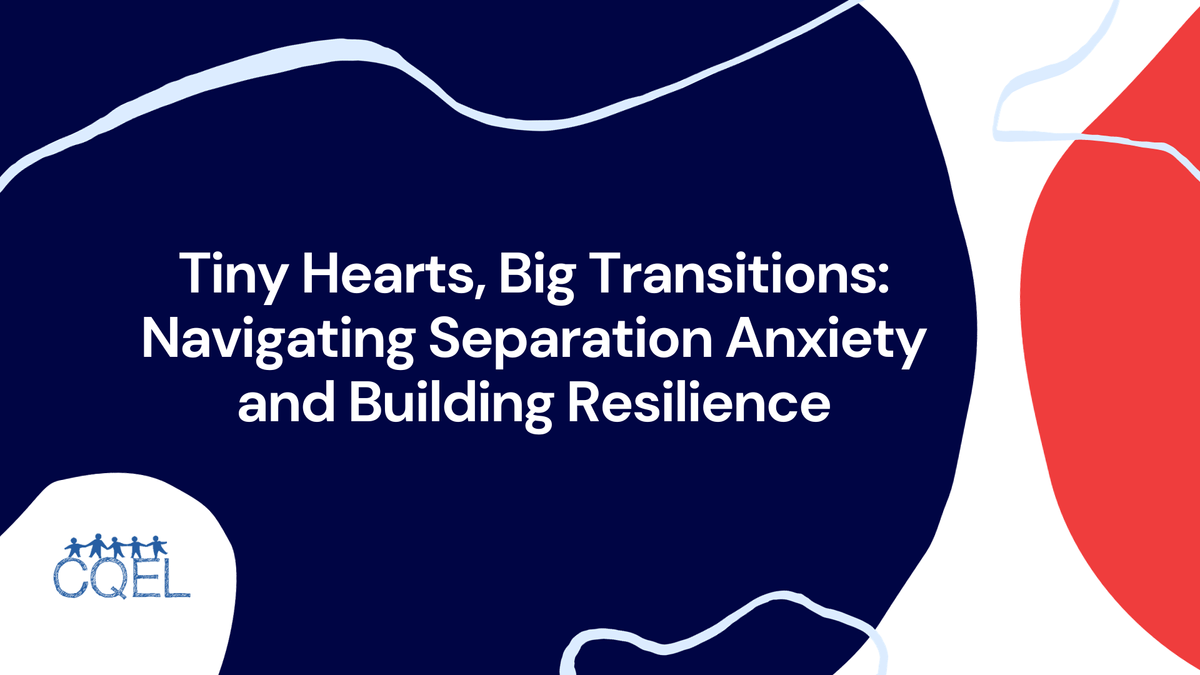Tiny Hearts, Big Transitions: Navigating Separation Anxiety and Building Resilience
Tiny tears & big goodbyes? Embrace separation anxiety as a stepping stone to resilience! Build confidence, navigate transitions, & celebrate victories. Discover resources, playful tips, & support for growing hearts on their brave journey.

Little hands clutching yours, tears welling up as goodbye approaches – separation anxiety, a common developmental stage, can feel like a heartbreaking storm for both parent and child. But amidst the emotional waves, remember, this isn't a setback; it's a stepping stone. By understanding and guiding our tiny adventurers through these transitions, we're building resilience, confidence, and the emotional muscles they need to thrive.
Here's how to navigate separation anxiety with empathy and wisdom:
1. Validate the Feelings: Don't dismiss their fears or brush them aside with empty reassurances. Acknowledge their emotions, "I know you're sad saying goodbye, it's okay to feel that way." Let them know you understand and are there for them.
2. Create Predictable Routines: Structure and predictability offer comfort. Establish consistent routines for goodbyes, helloes, and daily transitions. Visual schedules with pictures can help young minds anticipate and prepare for changes.
3. Playful Send-Offs: Turn goodbyes into a fun mini-ritual. Sing a goodbye song, share a secret handshake, or give a special hug. Make it a positive, memorable moment that eases the sting of separation.
4. Practice Makes Progress: Encourage gradual separation experiences. Start with short solo trips to the park or store, building confidence and trust step-by-step. Celebrate their successes, no matter how small.
5. Stay Connected: Bridge the physical gap with emotional connection. Send reassuring texts, make video calls, and share their day together during reunions. Show them you're thinking of them even when apart.
6. Build a Support System: Seek support from trusted caregivers who can offer warmth and consistency during your absence. Knowing their beloveds are in good hands eases anxieties and fosters security.
7. Model Calm Confidence: Your own anxiety becomes contagious. Stay calm and positive during transitions, projecting confidence and trust that they'll be okay. Remember, your calm is their anchor in the storm.
Building resilience takes time and patience. There will be bumps and wobbly moments, but remember, each tear is a testament to the deep bond you share, and each successful transition a building block of confidence and independence.
Additional Resources to Navigate Separation Anxiety and Build Resilience:
- The National Child Traumatic Stress Network: https://www.nctsn.org/ offers resources and support for parents and caregivers dealing with childhood anxiety and stress.
- Zero to Three: https://www.zerotothree.org/ provides helpful tips and strategies for supporting emotional development in young children, including managing separation anxiety.
- The American Academy of Child and Adolescent Psychiatry: https://www.aacap.org/ offers information and advice about childhood anxiety disorders, including separation anxiety.
- Community Support Groups: Connecting with other caregivers facing similar challenges can offer valuable support and understanding. Consider local support groups or online communities focused on early childhood development and emotional well-being.
- Books:
- "The Whole-Brain Child" by Daniel J. Siegel and Tina Payne Bryson
- "What to Do When Your Child Frets and Fuss" by Dawn Huebner
- "The Highly Sensitive Child" by Elaine N. Aron
Bonus Tip: Celebrate their emotional courage! Talk about their bravery in overcoming challenges and acknowledge their progress. Let them know you're proud of their efforts, building confidence for future transitions.
Together, we can help our tiny adventurers weather the storms of separation anxiety and emerge stronger, more resilient, and ready to conquer the world with a heart full of courage and a smile that shines brighter than ever.
Remember, building resilience is a journey, not a destination. Let's walk it together, hand in hand, one goodbye, one hello, one brave step at a time.
